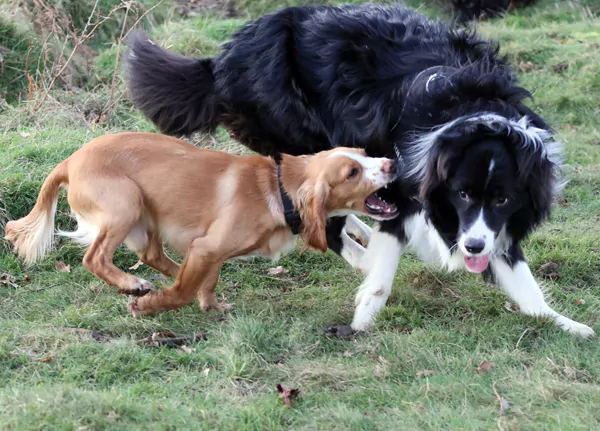Why Dogs Have Behavioural Problems
Why Many Dogs Have Behaviour Problems

Drives and Instinct: I have been asked on numerous occasions what the contributing factors are in so many of our dogs displaying behavioural problems.
Although it appears to be a simple question, things do not always have a simplistic answer.
I have managed to isolate the main culprits that are creating the behavioural epidemic affecting so many of our dogs today.
Lack of knowledge and a lack of research into the requirements of the chosen breed is certainly one of the problems I am seeing, plus the fear stories we get from vets and forums all play a part in aberrant behaviour.
There are so many different breeds and crossbreeds nowadays and they all have in many cases differing drives and instincts. understanding what drives your dog and its needs are paramount for a successful bonding and relationship with your new pet. This is, of course, more difficult to analyse with crossbreeds as you are cutting across different groups.
These are the current groups. Hounds, Working, Terrier, Gundog, Pastoral, Utility and Toy group. Each of these groups has differing drives and instincts. Buying a dog for what it looks like may not be the smartest way of choosing a dog as it may not suit your personality or lifestyle. Crossbreed across the groups and you may get a dog with a split personality Read my article (1) Designer Dogs Disaster or Success
Fear of Infections and Disease: The fear of disease or infections has led breeders and owners alike to make the tragic mistake of keeping their puppies isolated until they have completed their vaccinations. By taking this stance they risk ending up with fearful dogs that often become aggressive or have serious behavioural problems in later life. It does not have to be like that as long as you know what you have to do to make sure your pups and dogs have the very best start in life.
Early Socialisation: I am sure you have heard this term before but what does it really mean? There are two vital aspects that shape all mammals including humans, that is Nature and Nurture. One is related to genetics (Nature) which includes drive and instinct, the other means a learned aspect of behaviour (Nurture)
Early socialisation falls within the nurture part of the equation. That above all else is one of the main reasons for aggression and fear and timidity. I see many dogs with fear-based aggression and reactivity that can be aimed at other dogs or humans.
It may surprise some people that dog aggression is primarily fear-based and that it has most of its roots in a lack of early socialisation. The critical periods that affect your dog’s behaviour are in the first 16 weeks of your dog’s life, therefore, the breeder also has a large impact on the outcome of the puppies in their care.

Human Socialisation Period: The first important period is 0 to 12 weeks. The breeder should invite lots of people to come and handle the puppies, right up until they go to the new owner.
I bred a litter of puppies in 2017 working cocker spaniels and we had over 400 visits from practically everyone we knew. including children pensioners and other dogs.
It is critically important that the new owner make sure that at least a hundred people handle the puppy in a positive gentle way before the pup is 12 weeks of age. Take it around your local café or pub, go outside the school gates and let children treat and stroke the puppy.
Older people must also be introduced and strange environments, car journeys, traffic, noisy high streets other animals and literally everyday life. That should make the dog bombproof with people and various places.
Of course, if the puppy is taken home and if it is nervous or fearful from day one, then they may be a genetic problem that may stem from the sire or dam, It is rarer though in some cases, fear and timidity can be passed on by just the male as it is the mother (dam) that interacts the most with the puppies.
If the breeder has kept the puppies from all contact with people and other animals, then you must work very hard to overcome that lack of contact before the all-important 12 weeks have elapsed.
There are a number of breeders that claim they know everything about the breeding and rearing of dogs. These same breeders will not rehome their puppies until 12 weeks. They are sadly ignorant of the very real damage this causes. Avoid these breeders at all costs.
Canine Socialisation Period: This is the second part of these vitally important periods and is related to how the puppies and dogs relate to other dogs. The time frame for this is 0 to 16 weeks. People are often frightened to mix their dogs for fear of infections. Yet any puppy can mix with any other dog that has been vaccinated from week three of its life.
Puppies learn the all-important body language and communication skills and bite inhibition by playing with other puppies rather than adult dogs. Adult dogs do not play the rough-and-tumble games that pups play.
Puppy classes are therefore vitally important to canine socialisation and should be booked before you even get the puppy home. See my (1) Puppy Classes. If you do not live in my area then my Puppy Class page explains what to look for in a good puppy socialisation class.
Other Critical Periods: Though I have listed the human and canine socialisation periods that does not mean that there are no other important and vital periods. For instance, there’s the first fear period, which starts at 5 weeks and peaks between 8 and 10.5 weeks.
Any fearful or frightening episode during this period will have a more profound effect than at any other time in your dog’s life. There are other fear periods and these are explained in my article (2) Critical Periods in a Pups Growth.

Scary Sounds: One of the most important lessons you as the new owner must learn, is to never comfort a frightened dog.
Sympathy and comfort to a dog is not reassurance it is reinforcement, the exact opposite of how humans see comfort,
If your dog is startled or fearful of something and you follow your natural instincts which are to comfort and sympathise, then you will enhance the fear and increase the startle response.
This is especially important when it comes to sounds like fireworks, gunshots, thunder and traffic noises.
That is one of the reasons I created a high-quality training and behavioural sound desensitisation CD for dogs and puppies. This helps puppies as well as adult dogs. If young pups are gently desensitised at a very early age then they often do not get these problems later on in life. My sound desensitisation program has been used successfully for years to combat sound phobias in dogs.
Other Reasons for Behavioural Problems: Of course, there are many other reasons behavioural problems occur. These include dog food, especially ones with lots of Es, artificial flavours and colourants. Read my article (3) Dog Food and Behaviour where I test lots of dog food and list the ones I feed my dogs and why
A lack of essential vitamins and minerals is where supplements can help. Neutering is also a major player in negatively affecting behavioural and medical problems in dogs, other than the all-important early socialisation it is probably one of the commonest reasons for behavioural, aggression fear and timidity and health problems in dogs today. Worth Reading (4) Why Are Our Dogs Dying 11% Earlier Than 10 Years Ago. and (5) The Dangers of Neutering Dogs.
If your dog’s problems are related to fear, and the vast majority of behavioural problems stem from this, then for further help and advice read my article (5) Fearful and Timid Dogs. Which is top of Google for that search and is the most widely read article on the subject (6) Different Types of Dog Aggression Which is also first on Google and explains all the different types of aggression? (7) The Alpha Myth is also a revealing article on how dogs really learn
There is another area of concern when it comes to behavioural problems, You may not find many articles or books about this problem and that is Autism. I have dealt with about 30 dogs that were clearly showing autistic tendencies. After coming across what I thought was my first case I went into research mode, and really studied autism. This research made me realise that I had already worked with possibly 6 or 7 dogs that fitted and presented behaviour that was clearly on the autistic spectrum.
Autism is not an illness or disease and currently cannot be ‘cured’ The other important fact to understand is that autism is congenital, meaning that dogs or humans cannot suddenly become autistic, they are born with autism. That means that if your dog was showing unusual behaviour at a very young age then there is a possibility that the behaviour is related to one of the spectrums of Autism. Though it cannot be “cured” you can put in place a program that can help. This is my article (8) Can Dogs Be Autistic
©Stan Rawlinson
Dog Behaviourist and Obedience Expert
July 11th 2018 Updated 2023
(1) Designer Dogs Disaster or Success
(1) Puppy Classes
(2) Critical Periods in a Pups Growth.
(4) Why Are Our Dogs Dying 11% Earlier Than 10 Years Ago?
(7) The Alpha Myth
Leave a Reply Cancel reply
You must be logged in to post a comment.












Comments (6)
We have two sisters which are
We have two sisters which are 1.5years old. They are starting to fight now and again. Would it be a good idea for one of them to stay with a family member a few nights a week to break that sister bond
I think you need to read my
I think you need to read my article Rearing Sibling Dogs. I wrote some time ago it is first on Google. It explains the pitfalls of these actions. Unfortunately, a few nights a week will probably make it worse as the aggression will worsen when they are brought back together. Read the article and you will understand more on this problem.
Very good article.
This is an excellent article – in my experience, not many professionals know that much about behavioural problems. We have a female cavalier king Charles spaniel, called Seren, who was rescued from a puupy farm. She was kept in a cage with only her brothers and sisters until she was 14 weeks old, and she’s terrified of everything. She can’t go for walks as she becomes terror stricken, and has had epileptic fits from fear. We were told how to look after her, and what to do and what not to do, by an amazing animal behaviouralist, and she lives very happily with us and our other female cavvy and our cat. The sound desensitation was very good – extremely helpful. She doesn’t go out for walks – we exercise her by throwing a ball for her in the garden, which she loves, and with various agility activities, which she also enjoys. If she has to leave the house to see the vet, she has to be given a xanax tablet, howvever, because she is so terrified, she becomes completely motionless as if she’s in a trance. Her eyes become completely blank, and she basically shuts down. She won’t even flinch if she’s in pain, and so it’s imperative that any vet she sees is fully cogniscent of her history, otherwise she runs the risk of not being diagnosed properly. For instance, she’s got arthritis in her right shoulder, but she had to have an x-ray to diagnose it, as when our vet examined her, as usual, she simply stood completely still and showed no sign of pain. I don’t know if other dogs with similar problems would behave like this, but I thought it might be helpful to anyone who’s dog does have behavioural problems due to not being socialised.
Very good article.
Thank you for a very interesting and insightful email. Yes, you are absolutely right this is probably caused by lack of socialisation during the critical periods 0 to 16 weeks. Puppy farms are hideous places and fortunately, the law is changing and many of these dens of misery will be closed down. However, we are having other problems to take its place foreign puppies brought either illegally or legally into the country from puppy farms abroad.
I will make on further observation there is a possibility that your dog is autistic. It is not as common in dogs as it is in humans but it worth you reading my article Can Dogs be Autistic?. I think you will find it interesting, your dog is certainly displaying some indicators that it could be on the autistic spectrum. I applaud you for persevering with this poor dog.
Stan
A Really Good Article
Thank you for your excellent article on dog behavioural problems.
I took on a share in a female Dobermann at 12 weeks, she arrived from Ireland and played with a sibling in my garden for a while. After the breeder left, the puppy settled well, didn’t ever cry at night, but did sleep in the kitchen with my older dog. She didn’t seem to want to be close to us at all, but was happy to settle nearby. When I took her out, she was extremely nervous
of everything, although I managed to get her more used to traffic. She screamed when she met a large dog, and later, at seven months would react in the same way to all sorts of things. I thought this must have been due to lack of socialisation, but she had started spinning at four months old, it was so intense that she would pee and poo as she spun. She snapped at flies, and when there were no more flies, she could see them anyway, usually above my head. During her last week with me, she bit me hard three times, flying at me whilst off the lead. I badly needed help, but it was not easy to find. This dog was from working/show lines, and I took her twice a week for working training. When she was really bad, spinning for most of the day and very aggressive, I asked the vet for tranquillisers, and drove her back to the breeders in Southern Ireland.
I’m sorry this is a long post, but after thirty years of Dobermann ownership, this was a dreadful experience, and has taken me more a year to get over it.
I had spent a large amount of money on her, and didn’t want to go down the road of diagnosing epilepsy, as I felt it was more than this.
I would like to have your view on this problem, as I always suspected autism.
A Really Good Article
I have come across many spinning dogs and cured dozens is easy if you understand the trigger you can switch it off. One that comes to mind is the english bull terrier who has a spinning problem. This problem is genetic and has been link to autism. I have written an article called Can Dogs be Autistic. It is worth a read, it will give you an indication if autism is the problem in this case, from what you have described I think it is highly likely.